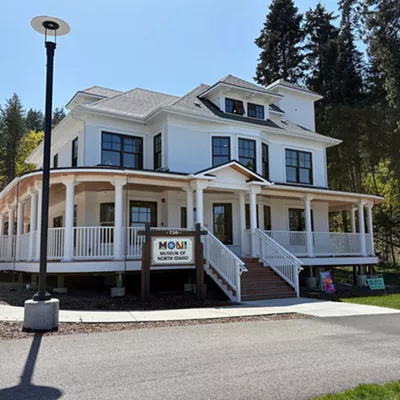Political scientist Grant McConnell sat on the stump outside his cabin up the valley from Stehekin and explained to me just how it was that the North Cascades National Park came to be. As I reflected on Laurel Siddoway's status report and analysis presented to the City Council as a videotape entitled"The River Park Square Deal," my mind wandered back to the story McConnell told to me that day, more than 20 years ago.
Seems that the Forest Service had sold the timber rights on both sides of Lake Chelan. Soon the clear-cutting would begin. McConnell, leading the few families who called Stehekin home, was determined to try to stop what he viewed as carnage in the making. But what to do? After all, a deal was a deal, as the River Park Square developers continually remind us.
McConnell, whose book Private Power and American Democracy continues to be regarded as a classic, understood that he was dealing with what James Madison termed a faction. "By a faction," wrote Madison, "understand a number of citizens, whether amounting to a majority or minority of the whole, who are united and actuated by some common impulse of passion, or of interest, adverse to the rights of other citizens, or to the permanent and aggregate interests of the community."
To cope with the effects of a faction, you need to bring to bear pressures to force compromise.
Given his environs, McConnell knew that he faced the challenge of moving the issue before a more diverse constituency. If the issue stayed local, then the dominant local interests -- the faction -- would prevail.
He turned to The New York Times and managed somehow to persuade the newspaper to publish a pictorial essay of Lake Chelan. The topic, if not the issue, was finally moved out of central Washington and into New York City and Washington, D.C.
Then, while he appreciated that the local Congressman could not be counted on, he thought that perhaps if he got the issue before the U.S. Senate, he'd have a chance. He went to Senator Henry Jackson, who agreed to hold hearings in Seattle. The logging companies showed up, armed with their many senior executives and attorneys. After all, a deal was deal, and they were there to make certain that the Senators understood this. All McConnell had was himself and a few families who owned cabins out of Stehekin.
McConnell successfully made the case that when the "permanent and aggregate interests of the community" are at stake, a deal may not be a deal after all.
A moratorium on the actual timber cutting was declared pending further investigation. While he had bought time, McConnell knew that he soon needed a bureaucratic ally. What agency might be interested in taking on the U.S. Forest Service? Ah, the answer was obvious. So they invited the head of the Park Service to Chelan and arranged to fly him over the lake and mountains. When he returned to shore, he said, "Grant, this would make a great national park."
And so the park eventually came to be and the deal everyone felt so bound by was undone.
I thought about all this when Councilman Steve Corker pointed out that two courts were hearing these parking garage cases; the court of law and the court of public opinion In keeping with the spirit of McConnell, I'd say this to Corker's comment: You're right on. So why won't he and others take McConnell's advice? Instead, they are bogged down trying to micromanage legal tactics. That's a losing game. Forget conspiracies -- there are enough lawsuits floating around to find every conspiracy and have enough left over to go after Lee Harvey Oswald's accomplices. Corker's needs, and the city's needs, are more immediate. More political.
In Saul Alinsky's Rules for Radicals, his Rule No. 3 is especially germane: "Wherever possible, go outside the experience of the enemy." Combine this with Rule No. 4: "Ridicule is man's most potent weapon." So, with a tip of the hat to Madison, here's an angle: get the issue on a different playground, broaden the audience and bring down an avalanche of ridicule on the developer, the city, all the attorneys. That's how you force compromise. That's how deals are undone.
How to do this? Talk the Wall Street Journal into coming back out here to Spokane; forget your Congressman, talk to your Senators; better yet, how about 60 Minutes? No, you don't have a lake and mountains to get their attention, but you do have Siddoway's videotape.
Boot that baby up and show Glen Edwards of Walker Parking Consultants tell the City Council that the garage will have to turn away 500 cars on weekends for lack of space. And here comes Roy Koegen, the city's very own bond attorney; watch as he tells the Council not to worry about that parking meter money. Nope, it will never be needed.
But you can't beat Betsy Cowles' performance. Faced by all these highly questionable numbers, she expresses no doubts. Nary a one. Here is my favorite scene. From that critical January, 1997, council meeting.
"The city is contingently pledging parking meter revenue," she told the council. "That money will only be used if the garage revenue is insufficient to cover land rent, operations and maintenance, and that is highly unlikely to happen.
"So why," she asks rhetorically, "won't that happen, as Mr. Koegen has pointed out? What's the guarantee?
Now comes her punch line, and it's a beaut: "...the garage is going to be located next to an amazing retail complex. It's a brand new Nordstrom store, a 24-screen cinema and a whole lot of stuff in between that's going to knock your socks off."
Mike Wallace would love this material. Arrogance, hubris, tragedy, stupidity, blinders, hope, social and cultural chasms, institutionalized obsequiousness, boosterism writ large, panic, fear, pride, presumption -- it's all there just waiting to be presented to a really big court of public opinion.


















